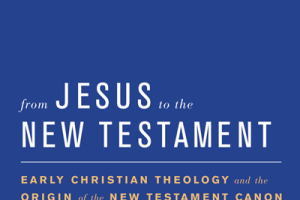The story of Noah and his ark is one that will never lose its ability to captivate young minds. When I was a child, I regularly reenacted the scene in our bathtub with plastic figures (unbeknownst to my parents, who were paying the water bill) and shared the story with my friends. But then something terrible happened: we all grew up. Some simply drifted away from the congregation, consigning the fanciful tale to the naïveté of their youth. For those who remained in the church, we may have heard the narrative in passing, but rarely as the focus of any single sermon. More than 200 years of historical and scientific research have incited the world to mock our beloved Noah, and many a preacher will not dare risk controversy by recounting the narrative as historical—or worse, as ahistorical. Has Noah’s ark finally capsized in a deluge of intellectualism, more than 4,000 years after the waters receded?
Christians have responded in various manners: some, through cognizant dissonance; others, through scientific dereliction. The latter case is exemplified by recent efforts to construct a theme park centered around a ‘life-sized’ ark. “What if we built the Ark (out of wood) today,” asks the Ark Encounter website. “What a powerful outreach to teach the world about God’s Word and the message of salvation!”
My reaction is torn. I understand the importance of Noah’s ark to the biblical narrative, but attached to the Ark Encounter’s evangelistic message are dubious, pseudoscientific claims regarding Earth history. As a geologist, I recognize that if Noah’s flood covered the Earth in our recent past, then it failed to leave a mark. Tragically, I have seen many Christians ‘jump ship’ after assenting to the same, but organizations like Answers in Genesis continue to insist that either it ‘really happened’ or Christianity is without a foundation. If this dichotomy is a false one, however, then by constructing an ark in Kentucky, we are chipping away at the ark that is Christ’s church.
I propose that the solution is profoundly simple and rooted in Scripture: “Make yourself an ark of gopher wood” (Gen. 6:14). Yes, let’s build an ark out of wood today—not of Kentucky pine, but of gopher wood. The term gopher, which has been left untranslated from the Hebrew, connects the story of Noah to that of Abraham and Moses. Derived from Akkadian, the word means “pasture” or “meadow” and is recounted by its linguistic cognate to describe Abraham and his descendants as Hebrews (gfr vs. hbr). Conceptually, the term also appears in the birth story of Moses, whose mother constructed an ark of papyrus reeds (i.e. wood from the meadow) coated with pitch (Exod. 2:3). The blueprint for Noah’s ark, itself a scaled-up version of the tabernacle, anticipates the building of God’s temple and, ultimately, Christ’s church. All are centered around an Israel of God built from living stones, whose vocation remains the same today. Set on the chaotic seas, we are called to take part in calming the waters by His Spirit (Gen. 8:1), as Noah did when he sent out the raven (Gen. 8:7).
Now that the beads are strung, let’s tie the Pentateuchal necklace together. Moses, whose name means child, is the seed of the woman (Gen. 3:15) that would die the death of Adam (Gen. 3:19; Deut. 34:5–6) on behalf of his people (Deut. 1:37) so that they might reenter and cultivate the garden of God (Gen. 3:20; Deut. 1:39). These are the literary elements so elegantly captured in the gospel narratives, so that Christ might be understood to fulfill the law (Matt. 5:17) as one greater than Moses (Matt. 17:1–5; John 6) and return his people to Eden like Joshua (cf. Josh. 5:13–15).
I submit to you, therefore, that the historical question of Genesis 6–9 is not primarily ‘whether it really happened’, but how is it happening now? The author of Genesis transformed an ancient tradition to present two ever-present realities common to the human condition: the justice and redemption of God. The grand irony of the narrative is that the cause of the flood itself (Gen. 6:5) and the promise never to flood again (Gen. 8:21) are one and the same: that the formations of man’s heart are wicked. This contradictory dialogue, which makes sense only in the reality of the cross (Rom. 3:25-6), foreshadows the heart-transforming gospel entrusted to us for the nations.
Perhaps the $24.5 million cost of the Ark Encounter would be better spent in service to our struggling communities and churches? Don’t miss the boat by overlooking the artistry of God’s narrative and the canonical significance of Genesis. Our ark is already being built, and on a foundation of far fewer materials—two planks and three nails.
Jonathan Baker is currently a Ph.D. student in geology and holds M.S./B.S. degrees in the same. The focus of his dissertation research is the use of stable-isotope geochemistry to characterize mid-Holocene climate change and modern climate dynamics of the Volga Basin and Izhora Plateau (Russia). Twelve years ago, he developed a passion for the Earth sciences while studying scientific questions raised by proponents of Young-Earth Creationism. His academic journey is recounted by his blog, Questioning Answers in Genesis, wherein he discusses geological and science/faith topics in light of the Young-Earth movement. In his spare time, he enjoys studying theology, literary criticism, and Russian language. He currently lives with his wife and two ferrets in Las Vegas, Nevada, but is looking forward to moving to St. Petersburg, Russia this May.






14 Comments
Leave your reply.